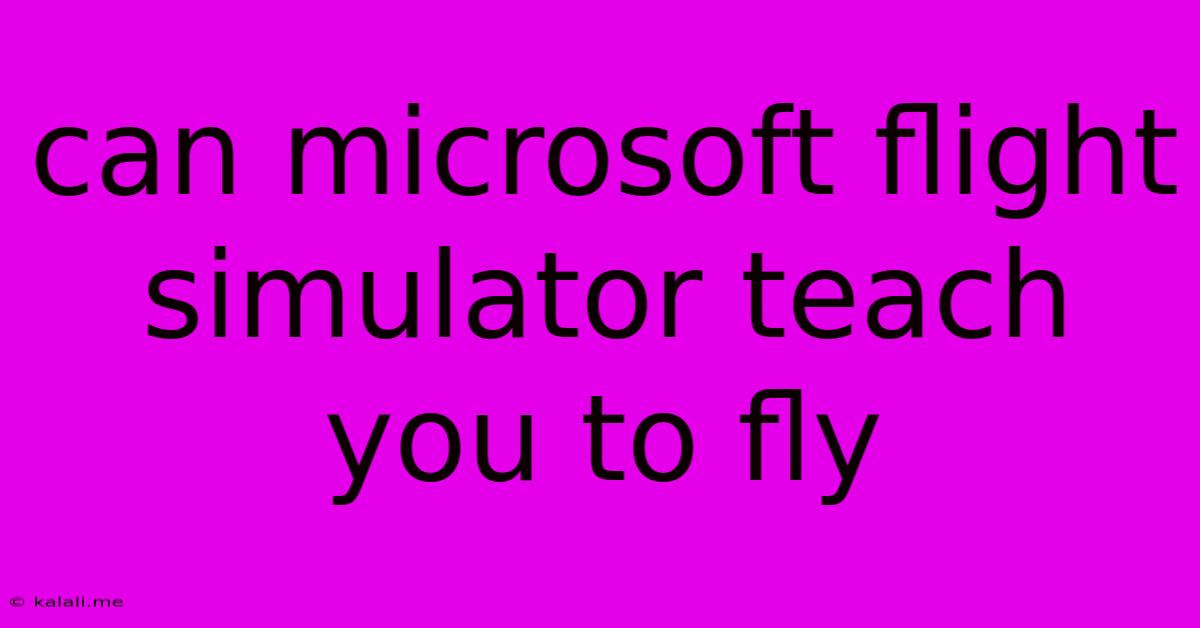Can Microsoft Flight Simulator Teach You To Fly
Kalali
Jun 04, 2025 · 3 min read

Table of Contents
Can Microsoft Flight Simulator Teach You to Fly? A Realistic Assessment
Meta Description: Microsoft Flight Simulator is incredibly realistic, but can it really teach you to fly? This article explores the simulator's capabilities, limitations, and whether it's a viable substitute for formal flight training.
Microsoft Flight Simulator (MFS) has captivated gamers and aviation enthusiasts alike with its breathtaking visuals and incredibly detailed simulation of flight. But a question frequently arises: can this incredibly realistic game actually teach you to fly a real airplane? The short answer is: no, it cannot replace formal flight training. However, it can be a valuable supplementary tool for aspiring pilots.
This article dives deep into the strengths and weaknesses of MFS as a learning tool, examining what it can and cannot teach you about aviation.
What Microsoft Flight Simulator Does Well:
-
Building Fundamental Understanding: MFS excels at teaching the fundamentals of flight. You'll learn about concepts like:
- Aerodynamics: Understanding lift, drag, thrust, and weight becomes intuitive through hands-on experience.
- Navigation: The simulator provides realistic navigation tools, allowing you to plan and execute flights using VORs, ILS, GPS, and other navigational aids.
- Aircraft Systems: While not as in-depth as real-world systems, you gain a basic understanding of various aircraft components and their functions.
- Emergency Procedures: While not a replacement for proper training, MFS exposes you to various emergency situations, allowing you to practice your responses in a safe environment.
- Flight Planning: MFS encourages meticulous flight planning, a crucial skill for real-world pilots. You'll learn to consider weather conditions, fuel requirements, and alternative airports.
-
Developing Hand-Eye Coordination and Situational Awareness: Successfully flying in MFS requires excellent hand-eye coordination and strong situational awareness – skills transferable to real-world flying. Managing multiple instruments, navigating complex airspace, and reacting to changing conditions all contribute to improved pilot skills.
-
Boosting Confidence and Reducing Anxiety: For those apprehensive about flying, MFS provides a risk-free environment to practice maneuvers and gain confidence before entering a real cockpit. This can significantly reduce anxiety associated with learning to fly.
What Microsoft Flight Simulator Lacks:
- Real-World Feedback and Hazards: MFS lacks the unpredictable elements of real-world flight. Things like turbulence, unexpected weather changes, mechanical failures, and human error are simulated, but they don't carry the same weight or consequence as in a real aircraft.
- Physical Feel and Sensory Input: The simulator can’t replicate the physical sensations of flying – the pressure changes, the G-forces, the engine vibrations – all vital elements in developing a true understanding of aircraft control.
- Instructor Guidance and Feedback: While MFS has tutorials, it lacks the personalized instruction and immediate feedback from a certified flight instructor. This crucial element is essential for safe and effective flight training.
- Legal and Regulatory Aspects: MFS doesn't cover crucial legal and regulatory aspects of flying, such as air traffic control communications, airspace regulations, and weather reporting procedures.
- Practical Application and Emergency Response: While it simulates emergencies, MFS cannot replace the hands-on experience and in-depth training required to handle real-world emergencies effectively and safely.
Conclusion: A Valuable Supplement, Not a Replacement
Microsoft Flight Simulator is a powerful tool for learning the theoretical and some practical aspects of flying. It can significantly enhance your understanding of flight mechanics, navigation, and aircraft systems. However, it's crucial to remember that MFS cannot replace formal flight training with a certified instructor. It's best viewed as a valuable supplementary tool to complement, not substitute, professional flight lessons. Aspiring pilots should consider MFS as a way to prepare for and enhance their learning, but never as a standalone method for obtaining a pilot's license.
Latest Posts
Latest Posts
-
I Like Your Christ But Not Your Christianity Meaning
Jun 05, 2025
-
How To Create A Class For Button In Joomla 4
Jun 05, 2025
-
2003 Honda Accord Starter Relay Location
Jun 05, 2025
-
Ps4 Controller Keeps Disconnecting From Pc
Jun 05, 2025
-
50 Psi On Mountain Bike Concrete Riding Only
Jun 05, 2025
Related Post
Thank you for visiting our website which covers about Can Microsoft Flight Simulator Teach You To Fly . We hope the information provided has been useful to you. Feel free to contact us if you have any questions or need further assistance. See you next time and don't miss to bookmark.